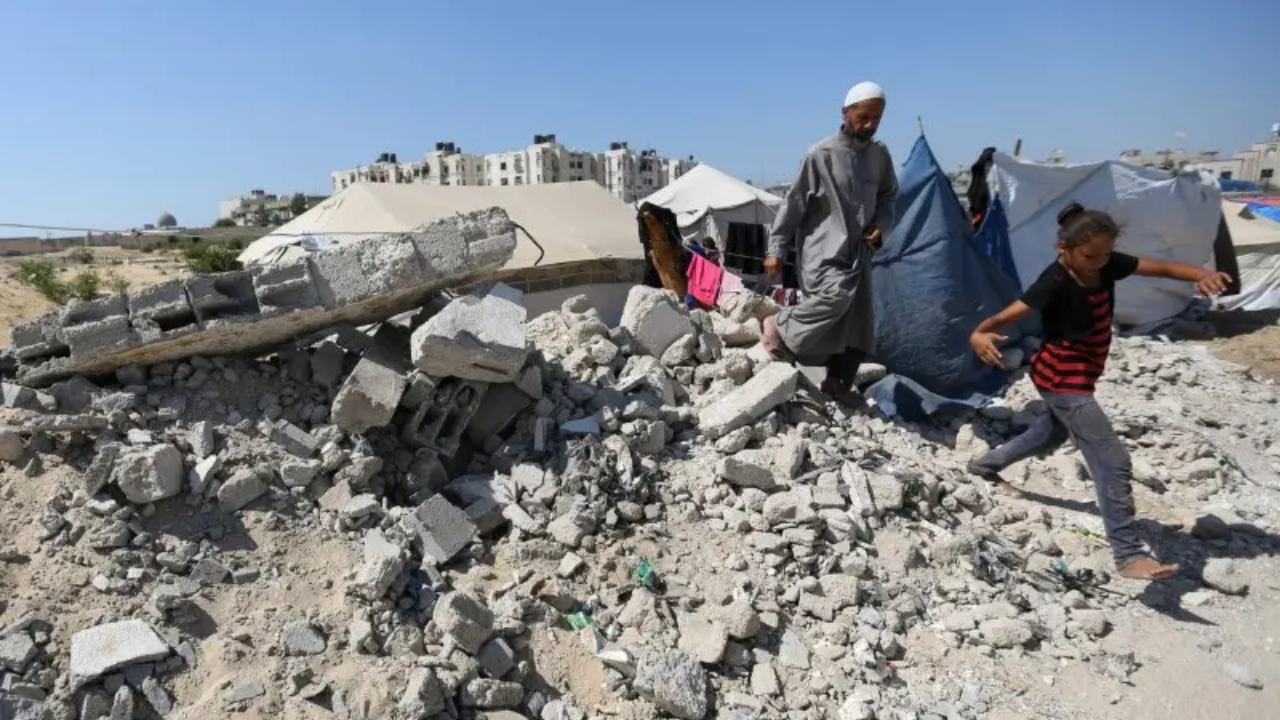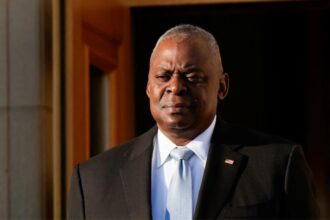Negotiations for a ceasefire in Gaza were temporarily halted in Doha on Friday, with plans for the negotiators to reconvene the following week. The goal is to reach an agreement that would end the conflict between Israel and Hamas and secure the release of the remaining hostages. US President Joe Biden acknowledged that while progress has been made, a resolution has not yet been achieved.
The United States, Qatar, and Egypt released a joint statement indicating that Washington had put forth a new proposal that addressed areas of agreement from the previous week’s discussions, narrowing the gaps in a manner that could facilitate the swift implementation of a deal. The mediators committed to continuing their work on the proposal.
“The path is now set for that outcome, saving lives, bringing relief to the people of Gaza, and de-escalating regional tensions,” they said in the statement.
Israel and mediators commenced the most recent round of talks on Thursday, aiming to end the war in Gaza that has claimed the lives of tens of thousands of Palestinians over the past several months. Although Hamas, the Palestinian militant group, was not directly involved in the negotiations, they were kept informed of the proceedings.
Izzat al-Rishq, a senior Hamas official, informed Reuters that Israel “did not abide by what was agreed upon” in prior talks, based on information provided by the mediators.
Meanwhile, Biden expressed optimism about the prospects of reaching a deal, saying that it was “much, much closer” than before the talks began. A senior administration official described the latest negotiations as the most productive in months, with negotiators set to reassemble in Cairo the following week with the hope of finalizing an agreement.
The official, speaking on condition of anonymity, stated, “It was consensus of all of the participants over the past 48 hours that there’s really a new spirit here to drive it to a conclusion.”
“The Israeli team that was here was empowered…We made a lot of progress in the number of issues that we’ve been working on,” the official added.
Biden announced that he had instructed his negotiating team to present the comprehensive bridging proposal put forward on Friday, which he believes provides the foundation for a final agreement on a ceasefire and hostage release deal.
The US president that he had discussions with the Emir of Qatar, Sheikh Tamim bin Hamad al-Thani, and the President of Egypt, Abdel Fattah al-Sisi, both of whom expressed their strong support for the US proposal. The president said that teams will continue their technical work on the ground, and senior officials will meet in Cairo “before the end of the week”.
To reaffirm the United States’ commitment to Israel and emphasise that no one in the region should take actions to undermine the process now that a comprehensive ceasefire and hostage release deal is in sight, Biden is sending Secretary of State Antony Blinken to Israel.
On Friday night, Biden expressed optimism about the prospects of a ceasefire deal but cautioned that it was “far from over.” When asked when a ceasefire would begin if a deal is reached, Biden responded, “That remains to be seen.”
Israel has maintained that peace will only be achievable if Hamas is eliminated, while Hamas has said that it will only accept a permanent ceasefire, not a temporary one. Other challenges have included the sequencing of the deal, the number and identity of Palestinian prisoners to be released alongside Israeli hostages, control over the Gaza-Egypt border, and free movement for Palestinians within Gaza.
According to an Israeli official, its delegation in Doha was returning home, and Israeli Prime Minister Benjamin Netanyahu was expected to meet with Blinken on Monday.
On Friday, Israeli forces bombarded targets across the small, densely populated Gaza and issued new orders for people to evacuate areas it had previously designated as civilian safe zones, claiming that Hamas had used them to fire mortars and rockets at Israel.
As hundreds of families fled with their salvaged belongings, the United Nations called for a week-long pause in fighting to allow for a polio vaccination campaign, as the disease was spreading among the displaced. The Palestinian health ministry confirmed in a statement that it had detected the first case of polio in the Gaza Strip.
The latest violence in the long-standing Israeli-Palestinian conflict was triggered on October 7 when Hamas attacked Israel, killing 1,200 people and taking about 250 hostages, according to Israeli tallies.
Israel’s subsequent military campaign has resulted in the deaths of more than 40,000 Palestinians, mostly civilians, according to Palestinian health authorities. It has also displaced nearly the entire population of 2.3 million, caused a hunger crisis, and led to genocide allegations at the World Court, which Israel denies. Israel has stated that it eliminated 17,000 Hamas fighters while also claiming that the group uses civilians as human shields.
The United States, Qatar, and Egypt released a joint statement indicating that Washington had put forth a new proposal that addressed areas of agreement from the previous week’s discussions, narrowing the gaps in a manner that could facilitate the swift implementation of a deal. The mediators committed to continuing their work on the proposal.
“The path is now set for that outcome, saving lives, bringing relief to the people of Gaza, and de-escalating regional tensions,” they said in the statement.
Israel and mediators commenced the most recent round of talks on Thursday, aiming to end the war in Gaza that has claimed the lives of tens of thousands of Palestinians over the past several months. Although Hamas, the Palestinian militant group, was not directly involved in the negotiations, they were kept informed of the proceedings.
Izzat al-Rishq, a senior Hamas official, informed Reuters that Israel “did not abide by what was agreed upon” in prior talks, based on information provided by the mediators.
Meanwhile, Biden expressed optimism about the prospects of reaching a deal, saying that it was “much, much closer” than before the talks began. A senior administration official described the latest negotiations as the most productive in months, with negotiators set to reassemble in Cairo the following week with the hope of finalizing an agreement.
The official, speaking on condition of anonymity, stated, “It was consensus of all of the participants over the past 48 hours that there’s really a new spirit here to drive it to a conclusion.”
“The Israeli team that was here was empowered…We made a lot of progress in the number of issues that we’ve been working on,” the official added.
Biden announced that he had instructed his negotiating team to present the comprehensive bridging proposal put forward on Friday, which he believes provides the foundation for a final agreement on a ceasefire and hostage release deal.
The US president that he had discussions with the Emir of Qatar, Sheikh Tamim bin Hamad al-Thani, and the President of Egypt, Abdel Fattah al-Sisi, both of whom expressed their strong support for the US proposal. The president said that teams will continue their technical work on the ground, and senior officials will meet in Cairo “before the end of the week”.
To reaffirm the United States’ commitment to Israel and emphasise that no one in the region should take actions to undermine the process now that a comprehensive ceasefire and hostage release deal is in sight, Biden is sending Secretary of State Antony Blinken to Israel.
On Friday night, Biden expressed optimism about the prospects of a ceasefire deal but cautioned that it was “far from over.” When asked when a ceasefire would begin if a deal is reached, Biden responded, “That remains to be seen.”
Israel has maintained that peace will only be achievable if Hamas is eliminated, while Hamas has said that it will only accept a permanent ceasefire, not a temporary one. Other challenges have included the sequencing of the deal, the number and identity of Palestinian prisoners to be released alongside Israeli hostages, control over the Gaza-Egypt border, and free movement for Palestinians within Gaza.
According to an Israeli official, its delegation in Doha was returning home, and Israeli Prime Minister Benjamin Netanyahu was expected to meet with Blinken on Monday.
On Friday, Israeli forces bombarded targets across the small, densely populated Gaza and issued new orders for people to evacuate areas it had previously designated as civilian safe zones, claiming that Hamas had used them to fire mortars and rockets at Israel.
As hundreds of families fled with their salvaged belongings, the United Nations called for a week-long pause in fighting to allow for a polio vaccination campaign, as the disease was spreading among the displaced. The Palestinian health ministry confirmed in a statement that it had detected the first case of polio in the Gaza Strip.
The latest violence in the long-standing Israeli-Palestinian conflict was triggered on October 7 when Hamas attacked Israel, killing 1,200 people and taking about 250 hostages, according to Israeli tallies.
Israel’s subsequent military campaign has resulted in the deaths of more than 40,000 Palestinians, mostly civilians, according to Palestinian health authorities. It has also displaced nearly the entire population of 2.3 million, caused a hunger crisis, and led to genocide allegations at the World Court, which Israel denies. Israel has stated that it eliminated 17,000 Hamas fighters while also claiming that the group uses civilians as human shields.
Source : Times of India









